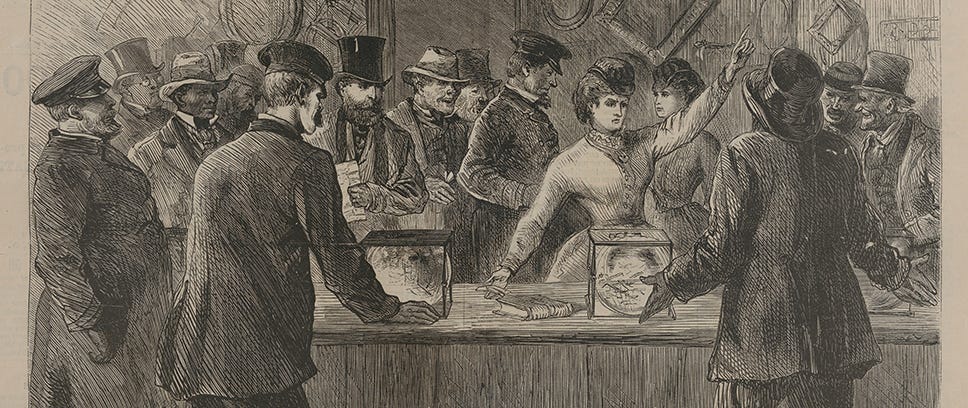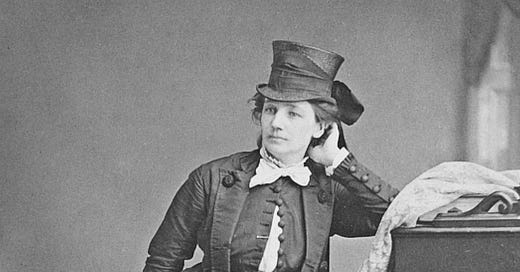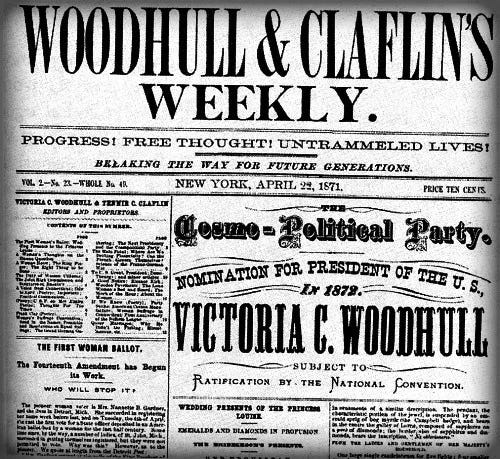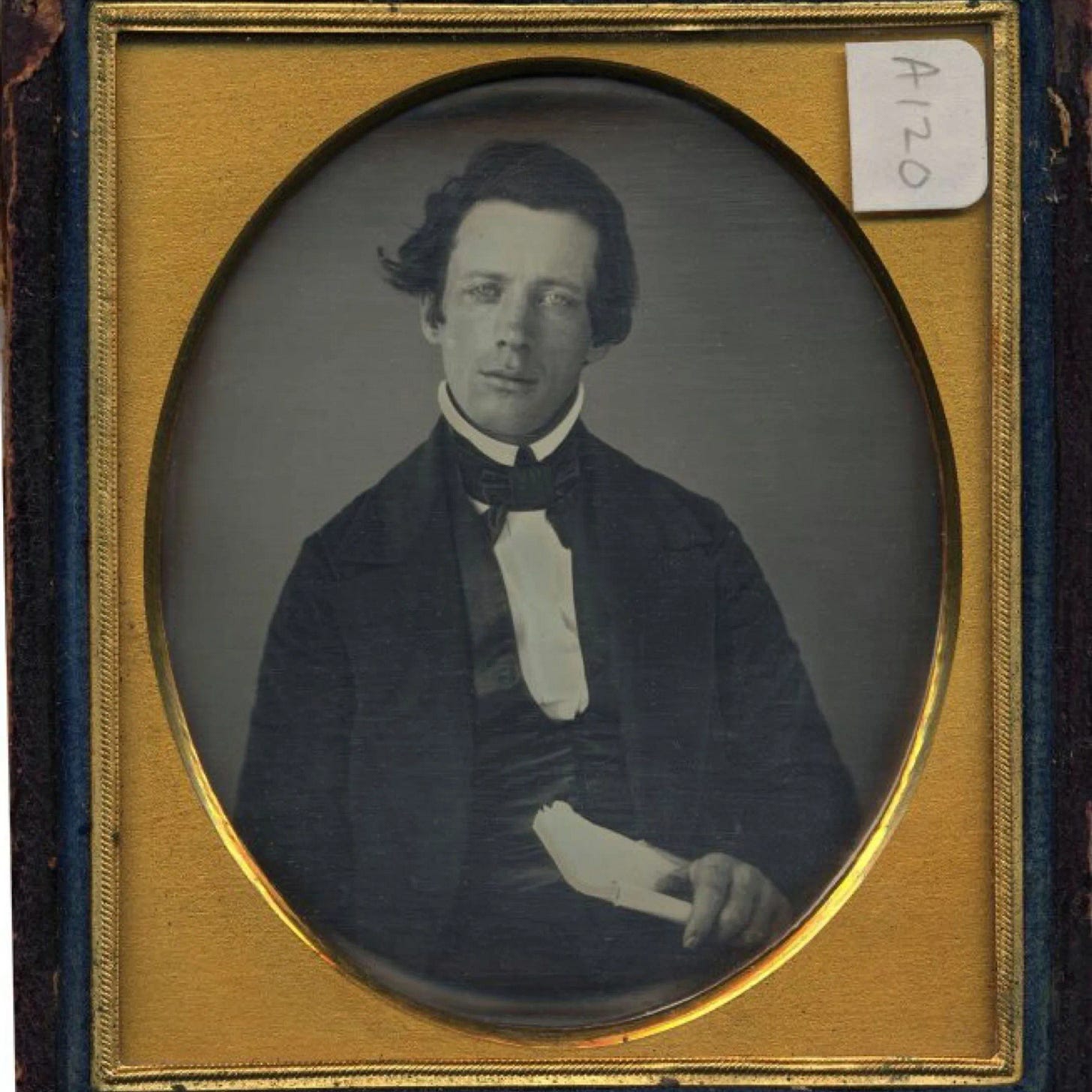the spiritual stockbroker who could've been our first female president
victoria woodhull ran for president in 1872 on a platform of feminism and labor rights far ahead of her time
hilary clinton was not the first woman to run for president. in fact, marianne williamson wasn’t even the first witchy woman to run for president. both of those titles have already been claimed by victoria woodhull over 150 years ago. the healer slash psychic medium slash stockbroker slash tabloid journalist ran on a radical campaign that would’ve done numbers on leftist twitter today: the regulation of monopolies, nationalization of railroads, abolition of the death penalty, and that women should be able to wear short skirts and have as many romantic partners as they want without needing to get married (now that would’ve done numbers on tumblr.)
once could say victoria held many lives, yet each different career path was a direct influence of the one that came before it. victoria’s ability to communicate with the dead eventually led to her and her sister owning the first female brokerage firm on wall street. her presidential campaign almost had fredrick douglass as her running mate. yet how is such a champion of women’s rights, such a thinker ahead of her time so relatively unknown in history. well, some parts are complicated. and some parts are infuriatingly predictable.
victoria was born to a poor family who would go around the country selling “miracle cures” for common health problems. sort of like the tummy tuck tea influencers of today. and like tummy tuck tea, the miracle “cures” didn’t do much of anything. yet young victoria had a knack for fortune telling and speaking with the dead. her father put her and her sister, tennessee, to work. at age 15, victoria saw a ticket out and got married to a 28-year-old man claiming to be a doctor and the new york city mayor’s nephew (spoiler: he was none of those things).
the disillusionment of marriage came fast. after birthing two kids, victoria realized her husband was a liar, an alcoholic, and an absent father. she worked odd jobs to support her family but she couldn’t stand being around this man. in the 1850s, divorce was not socially acceptable and limited by law. women stayed in bad marriages because they didn’t have an option to leave. it was this incident that inspired victoria to become a vocal champion of the “free love” movement: the idea that women should be able to stay in a relationship for as long as they are happy and leave whenever they wanted to. a laughably radical notion at the time, but if you’ve been able to leave a relationship without losing your job, home, and all your friends, chances are that has victoria’s fingerprints all over it.
“i have an inalienable, constitutional and natural right to love whom i may, to love as short or long a period as i can; to change that love every day if i please… and with that right neither you nor any law you can frame have any right to interfere.”
-victoria woodhull. (rip, you would’ve loved situationships)
victoria left her husband with her kids and joined her sister, tennessee, to be traveling fortune tellers and healers. and they were no joke. the sisters demonstrated such powers as accurately recalling past events and predicting future ones, finding missing objects and people. victoria also relayed messages from loved ones who had “passed over.”
their talents caught the attention of cornelius vanderbilt, shipping and railroad magnate and one of the richest americans at the time. he needed clairvoyants to contact his recently deceased wife and enlisted victoria and tennessee for the job. word of their services spread across wall street and victoria began making lots of money advising finance bros, almost $15 million in today’s money.

following the financial advice of vanderbilt, victoria and tennessee opened a brokerage firm, the very first women to ever do that on wall street. their firm - woodhull, claflin & company - was exclusively for female clients. victoria met women who wanted to invest, but were unable to do so because male brokers didn’t take them seriously. victoria also believed financial success was the true key to a woman’s independence, even more than voting.
what followed was what men have been dutifully doing for over 150 years: being babies. the firm was chastised for excluding them. journals published images of the sisters running their firm in their underwear and accused them of “prostitution” and “being impure” and whatever other insult was reserved for unmarried, independent women. but victoria kept her head down and focused on her goal: improve rights for women, workers, and the poor.
and so in 1870, victoria enters her journalism era. with the money made from the brokerage firm, she and tennesee publish their newspaper, woodhull & claflin’s weekly. by now, victoria had made a name for herself as a champion of women’s rights and caught the attention of suffragettes like elizabeth cady stanton and susan b anthony. victoria becomes the first woman to testify to the house judiciary committee, arguing that women already have the right to vote by virtue of the 14th amendment (grants equal rights for all) and 15th amendment (prohibits the denial of voting rights based on race, color, or previous enslavement). as you may know already, congress did not listen.
infuriated at the lack of progress, victoria decides to run for president in 1872. she is nominated by the newly created equal rights party, with frederick douglass as her running mate. although he never acknowledged his nomination, the ticket was doomed from the start. her nomination stirred the controversy of mixing white and black people in public life - a stance even elizabeth cady stanton and susan b anthony had. but her critics were even more focused on something more scandalous: victoria’s newspaper.
her newspaper quickly became known for its way too radical ideas, such as championing sex education, women’s suffrage, and free love. remember free love was the idea that women should be making the decisions about the fate of a relationship, at a time where marriages were mostly business transactions and wives lived at the whims of their husbands.
the free love thing was especially heinous to the religious cohort, especially to a preacher named henry ward beecher. henry wasn’t just your average jesus freak, he was a nationally renowned preacher who toured the country giving sermons. now here’s where people get complicated and layered. henry was known for being an anti-abolitionist. he raised funds to send rifles to abolitionists and even helped runaway slaves. if his name sounds familiar, his sister was harriet beecher stowe, the woman who wrote famed anti-slavery novel, uncle tom’s cabin.
but despite all his good deeds, henry was a womanizer who in many instances forced himself on women. victoria caught wind that he was having an affair with a woman. fueled by the hypocrisy of men getting away with being adulterers, while they attacked women for wanting sexual freedom, victoria exposed henry’s affair and wrote about the sexual double standard. this affair became the biggest scandal of the time. the coverage of henry’s trial rivals the coverage of oj simpson’s trial.
another thing that has been true for 150 years now: a beloved man will always have more public support than the outspoken woman who dared speak against him. victoria and tennessee were arrested on charges of “publishing obscene content.” because the newspaper was distributed through the post, this very incident inspired congress to pass the now-famous comstock laws. the law punishes distributors, such as the usps, for sending immoral content through the mail. it is this very law that is invoked today to punish providers for sending abortion pills through the mail.
victoria was quickly alienated and, of course, did not become president. she was too radical for even the feminists of her time. after years of legal battles, victoria and tennessee were forced to shutter their newspaper. in 1877, the sisters left the country for england (ironically, not the first women i’ve written about that fled the united states due to being crucified by the public).
and here is where victoria’s views start to change a bit. once an advocate for free love, victoria switches to a more conservative approach of championing motherhood and marriage. it’s unknown whether her views really evolved to this, or whether she wanted to distance herself from public vilification.
perhaps victoria’s weirdest arc: she began writing about eugenics. but at the time in the 1890s, being pro-eugenics wasn’t a “controversial” stance. this was before the nazis’ coercive eugenics of forcibly sterilizing people seen as “undesirable” (such as those with disabilities, mental illnesses, or were homosexual.) victoria was seen as an “anarchist eugenicist,” one who suggested things like “women should be able to terminate pregnancies if their child has a disability".” however, historians uncovered evidence of her supporting forced sterilization.
victoria lived out the rest of her days in england, dying in 1927. fortunately she lived to see women get the right to vote.
***
my 2025-binary-thinking brain is unsure what to make of victoria woodhull. it’s so easy to write her off as problematic, considering her views on eugenics and advocating against free love later in her life. she also duped countless people in her younger days of offering fake medicine for money. in 2003, an organization was founded in her name and they advocate for sexual freedom as a fundamental human right - a belief that even victoria herself abandoned.
yet victoria woodhull held many lives, and in this research i’ve found history tends to cling on one or two of those and make them her whole legacy. is there a way to honor her achievements, while also acknowledging the harm she did cause? god knows the men in history get that right.
sources: womenshistory.org, alena r pirok, nyhistory.org, usatoday







Ever since I learned about Woodhull on a docent tour at the National Portrait Gallery I have NEVER stopped thinking about this one political cartoon of her. I love your work and I wish this cartoon was included in the article bc it's ICONIC.
https://www.loc.gov/item/95512460/ (Library of Congress link)
Text states: "GET THEE BEHIND ME, (MRS.) SATAN!"
Subheader states: "Wife (with heavy burden): 'I'd Rather Travel The Hardest Path of Matrimony Than Follow Your Footsteps."
Image Description: Woodhull illustrated with gigantic devil wings and horns holds a poster reading "Be Saved By Free Love" heading down a craggy mountain path. The "wife" heads up the mountain path with a walking stick, holding an infant, with 2 children and her actively drunk husband strapped to her back. She looks over her shoulder with contempt at Woodhull.
This cartoon is such a metaphor for women's issues I literally think about it all the time and send it to people multiple times a year. The hardest path over the free path.
I think I read that she got men to disclose stock tips when they fell for her but I may have it wrong